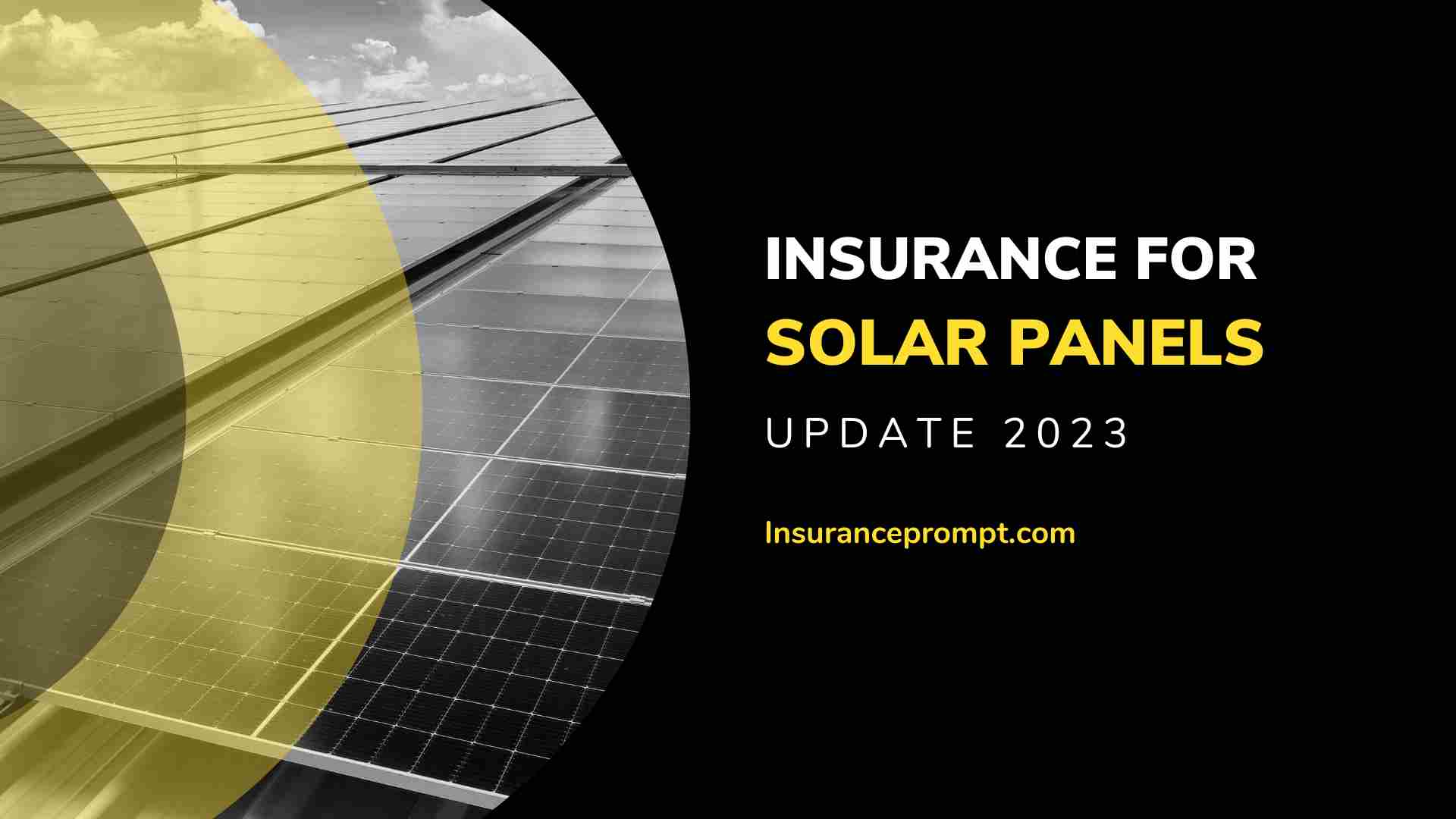Introduction
Insurance for Solar Panels is a great concern in 2023. As more and more homeowners turn to renewable energy sources, the popularity of solar panels continues to increase. However, many homeowners are unsure if their insurance will cover the installation and potential solar panel damage.
This is where solar panel insurance comes in, offering specific coverage for your solar panels and ensuring your investment is protected.
This article explores insurance coverage for solar panels and provides essential information to ensure your homeowners’ policy includes them.
Key Takeaways
- Homeowners with Solar Panels: Provides information on choosing a solar company, solar panel installation, the impact on home value, cost, performance, ownership, net metering, and homeowner’s association requirements.
- Why Solar Panels Almost Always Increase Your Home Value: Discusses how solar panels can increase home value through energy bill reduction, size correlation, external factors, condition and appraisal, and utility bill savings.
- Does Home Insurance Cover Solar Panels for Homeowners?: Most insurers cover solar panels under home insurance policies as long as the policy covers the damage. It mentions coverage for rooftop and ground-mounted panels and the importance of reviewing the policy and discussing coverage options with the insurer.
- The Benefits of Insurance for Solar Panels: Highlights the benefits of having dedicated insurance for solar panels, such as comprehensive coverage for damage, coverage for unique risks associated with solar energy systems, and peace of mind.
- Connect With Your Insurance Agent: Emphasizes the importance of communicating with the insurance agent to ensure adequate coverage for solar panels and discusses the questions to ask the agent regarding coverage, deductibles, liability limits, exclusions, and overall policy impact.
- Adjust Claim Limits if Needed: Advice reviewing and understanding the claim limits of the insurance policy, considering the value of solar panels, and adjusting the limits to ensure adequate protection.
- Do Solar Panels Increase Home Insurance Premiums?: States that solar panels can impact home insurance premiums, but the effect depends on the insurer and policy. It suggests contacting the insurer before installing solar panels to understand the impact on premiums and whether additional coverage is required.
- What Type of Solar Panel Damage is Covered in Homeowners Insurance Policies?: Most homeowners insurance policies cover solar panels for the same perils as the home’s dwelling, such as windstorms, fire, lightning, hail, or fallen trees. However, some policies may exclude damage caused by specific threats, such as wind.
- Roof Damage, Solar Panels, and Insurance Coverage: Discuss how homeowners’ insurance policies may cover roof-mounted solar panels if they are damaged by covered perils such as wind or hail. However, some insurers may not cover wind or hail damage to roof-mounted solar panels.
Table of Contents
Homeowners with Solar Panels: What You Need to Know
Choosing a solar company: Ensure you read reviews and find a reputable local installer to maximize incentives and benefits.
Solar panel installation: Schedule a site visit to assess the compatibility and suitability of the solar panel system for your home.
Impact on home value: Investing in solar panels can increase your home’s value by an average of $15,000.
Solar panel cost: The average residential installation cost is around $15,960, with potential rebates and financing options available.
Solar panel performance: Panels are designed to withstand various weather conditions, and performance expectations should be included in the bid.
Solar panel ownership: Leasing involves assigning tax credits, while ownership grants you full control without needing assignment upon selling.
Solar panel suitability: Consider ownership, sunroof, and high electricity bills for the best return on investment.
Net metering: Inquire with your utility about arrangements for excess power produced and credited back to the grid.
Homeowner’s association: Check if approval is required from your association for solar panel installation.
Solar panel performance: According to the Department of Energy, most solar-powered homes receive at least 40% of their energy from solar.
Why Solar Panels Almost Always Increase Your Home Value
Solar panels and home value: Installing solar panels can impact home value, but various factors come into play. Key findings include:
- Energy bill reduction: Solar panels can add value, with an incremental increase for every reduction in annual energy bills.
- Size correlation: There is no proven correlation between the size of solar panels and the increase in property value.
- External factors: Location, local electricity rates, and solar system value can influence market value.
- Condition and appraisal: A well-maintained solar system can considerably raise property value; studies show an average appraisal value increase.
- Utility bill savings: Home value can increase based on the amount a solar energy system saves.
In summary, while solar panels can potentially increase home value, factors like location, rates, system quality, and utility bill savings should be considered.
Does home insurance cover solar panels for homeowners?
According to the Solar Energy Industries Association, residential solar energy has experienced an average yearly growth rate of 68% over the last decade. According to the Center for Sustainable Energy, installed rooftop solar energy systems can cost between $15,000 and $25,000.
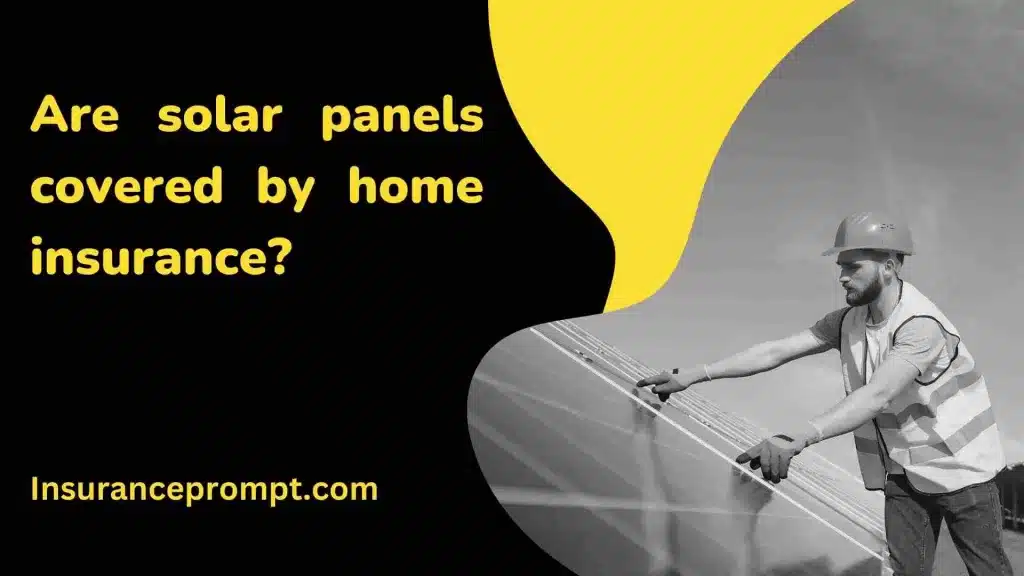
Most insurers cover insurance for solar panels as long as the policy covers the damage. If the panels are damaged by wind, fire, lightning strikes, hail, or a fallen tree, you will likely be covered for repairs or a replacement system.
If your solar panels are permanently attached to your home’s structure, such as rooftop-mounted panels, your homeowners’ insurance policy may cover them as part of your dwelling coverage. If the solar panels aren’t attached to your home, such as ground-mounted panels, they may be covered by your homeowners’ insurance policy under another structure’s coverage.
It’s worth noting that some insurers may not cover damage caused during the installation process. However, any damage to your home or solar panels during installation should be covered by your installer’s warranty.
While solar panels are typically covered under standard home insurance policies, reviewing your policy and discussing coverage options with your insurer is a good idea. You may consider raising your coverage limit to ensure you’re covered for all possibilities.
If you want to raise the coverage limit of your insurance for solar panels, consult your agent to adjust your policy. Know whether you need a separate policy. Most rooftop solar energy systems are covered by standard homeowners policies, which doesn’t change your insurance plan.
Specific systems like solar panel carports or ground-mounted panels may require an add-on or separate policy. Whether or not these different types of systems are covered in your insurance for solar panels depends on your policy type.
If your system is large enough to merit its coverage, you may qualify for a separate policy or add-on rider to your current policy.
Specific risks covered by solar panel insurance
Insurance coverage for solar panels: Solar panel insurance provides coverage for specific risks associated with rooftop solar panels. Here are key points to consider:
- Covered perils: Solar panel insurance may cover damage caused by perils like fire, windstorm, and hail.
- Top risk exposures: The primary risk exposures for roof-mounted solar panels are fire, wind, hail, theft, and water damage.
- Protection under homeowners insurance: Solar panel insurance is typically included in homeowners insurance policies, eliminating the need for separate coverage.
- Adequate policy limit: Ensure your policy limit is sufficient to cover both home and solar panel damage, especially in the case of severe damage.
- Consult your insurance agent: Speak with your insurance agent to understand your coverage options and find the best fit for your insurance needs.
In summary, solar panel insurance is generally incorporated into homeowners insurance policies, offering protection against specific risks. To ensure adequate coverage, confirm that your policy limit accounts for potential damage to both your home and solar panels. Discuss your options with an insurance agent for personalized guidance.
The benefits of insurance for solar panels
Insurance for your solar panels can provide peace of mind and protection in case of unexpected events, such as theft, damage, or malfunction. A new solar panel installation can be a significant investment, and having insurance coverage can help you avoid financial losses in case of accidents or other issues.
When choosing an insurance policy, it’s essential to read the terms and conditions carefully and ensure it covers your specific needs. You may also want to consider the reputation and experience of the insurance provider and the solar panel installer and ensure your personal information is secure.
Solar panels save you a lot of money on your electricity bill over time, and they also help reduce your home’s carbon footprint and allow you to take advantage of solar credits from the national government, which also increases the value of your home. These are some of the Benefits of Solar Panels.
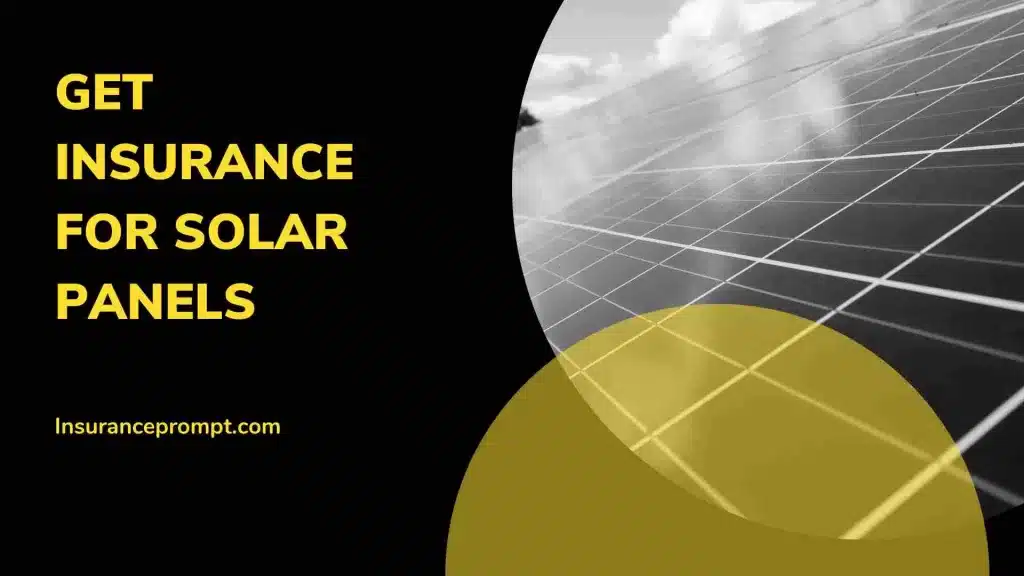
insurance for solar panels is a type of insurance policy that provides coverage for solar panels and other components of a solar energy system. While many homeowners insurance policies cover solar panels to some extent, having dedicated solar panel insurance can provide additional protection and peace of mind.
One benefit of having insurance for solar panels is that it can provide more comprehensive coverage for damage to your solar panels.
Unlike standard homeowners insurance policies, which may have limitations on coverage for solar panels, a dedicated solar panel insurance policy can cover a wider range of risks, including damage from natural disasters, equipment failure, and other incidents that may not be covered under a standard policy.
Another benefit of having insurance for solar panels is that it can provide more specific coverage for the unique risks associated with solar energy systems. This may include coverage for issues such as power interruption, loss of income due to system failure, or even theft of solar panels.
When choosing insurance for solar panels policy, several factors must be considered. First, it’s essential to understand what coverage is included in the policy, and it’s important to check your policy details to confirm you have enough coverage and what risks are specifically covered.
Some policies may limit coverage or may not cover certain types of damage or risks. It’s also important to consider the policy’s cost and any applicable deductibles or other fees.
In addition, it’s crucial to choose a reputable insurance provider with experience with solar energy systems. Look for a provider that offers specialized coverage for solar panels and has a track record of providing quality service to customers. Consider reading customer reviews or getting recommendations from other solar panel owners to help you choose the right insurance provider.
While the initial costs of going solar might seem steep such as solar panel installation, most solar systems pay for themselves in less than ten years.
On the other hand, Many state and local governments offer tax savings for homeowners who install solar panels.
The federal government has recently extended a renewable energy tax credit known as the investment tax credit (ITC). The ITC allows you to deduct 26% of the cost of installing a solar energy system from federal taxes in 2020 and 22% in 2021 (and there’s no cap on the credit’s value).
Connect With Your Insurance Agent
Communicating with your insurance agent about solar panels is essential to ensure adequate coverage and avoid potential gaps. Your insurance agent can provide valuable information on what is covered under your policy and what types of coverage are available for solar panels. They can also assist you in getting the coverage you need to protect your investment in solar panels.

Your insurance agent can help you get coverage for solar panels by reviewing your current policy to see if it covers solar panels or by recommending a policy that does. They can also provide information on the various types of coverage available, such as liability coverage, property damage coverage, and business interruption coverage.
Some questions you may want to ask your insurance agent about solar panel coverage include the following:
- Does my current policy cover solar panels? If not, what types of coverage are available for them?
- What is the deductible for solar panel coverage?
- What is the limit of liability for solar panel coverage?
- Are there any exclusions or limitations in coverage for solar panels?
- How does coverage for solar panels affect my overall insurance policy?
In conclusion, it is essential to connect with your insurance agent to ensure that you have adequate coverage for your solar panels. Your insurance agent can provide valuable information on what types of coverage are available and help you obtain the coverage you need to protect your investment.
By asking the right questions, you can ensure you understand your coverage and are fully protected.
Adjust claim limits if needed.
Regarding insurance policies, claim limits are the maximum amount an insurance company will pay for claims on each type of coverage your insurance policy covers. It is essential to understand the limits of liability and the different types of limits a policy may contain, such as each claim or occurrence limit and aggregate or policy limit.
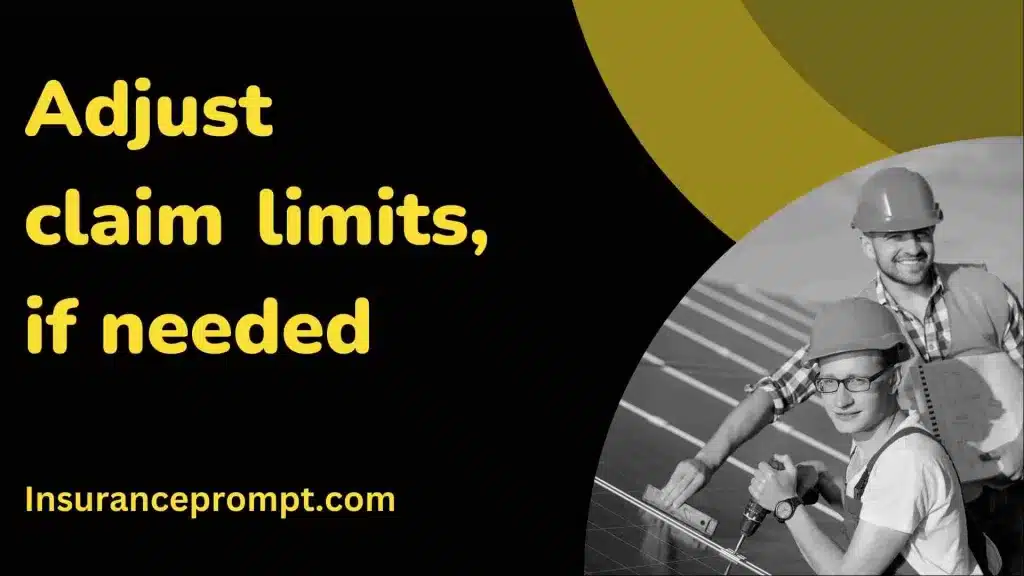
If additional expenses are incurred after the insurance pays up to the limit, the policyholder can be held personally responsible.
It is essential to review and understand the different types of limits that a policy may contain to adjust claim limits to account for the value of solar panels. For instance, when claiming damages caused to solar panels, it is essential to know the policy limits, whether there are specific limits for solar panel damages, and whether the coverage includes damages caused by weather events.
One may need to increase the limits for property damage coverage or purchase additional coverage specifically for solar panels to ensure adequate protection.
Reviewing your policy carefully and updating claim limits regularly is crucial to ensure that the policy provides adequate protection. Periodically updating the limits can also prevent the policyholder from being held personally responsible if additional expenses are incurred after the insurance pays up to the limit.
For instance, one may need to increase the limits for property damage coverage if the property’s value increases or if they add additional equipment, such as solar panels, not adequately covered by their current policy.
Do solar panels increase home insurance premiums?
Solar panels can impact home insurance premiums, but the effect depends on the insurer and policy.
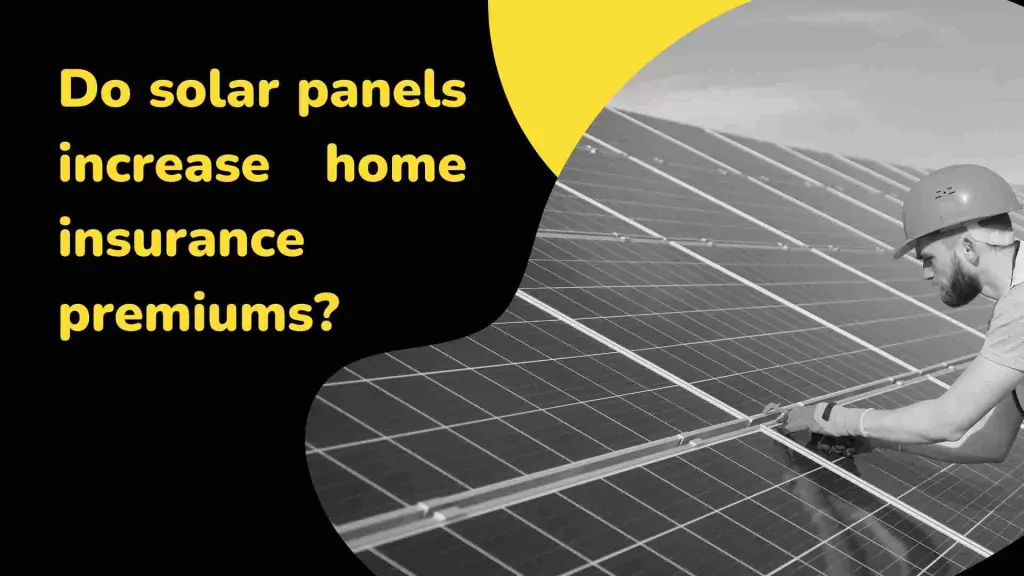
Most homeowners’ insurance policies cover solar panels as a permanent attachment to the property, similar to a patio or security system. Therefore, covering solar panels under home insurance won’t create the need for a particular add-on or rider, change the plan, or increase premiums in many cases.
However, some policies may exclude damage to these attachments when caused by specific threats such as wind[2]. Insurance companies determine premiums based on several factors, such as location, age of the home, construction materials used, and value of the personal property.
Solar panels can add value to a house; hence insurers may increase premiums to cover the home in case of an accident adequately. The increase in premium rates is likely to be minimal since homeowners will save money on electricity bills every month with solar panels installed.
It’s essential to contact your insurer before installing solar panels to understand how they will affect your policy and whether you need additional coverage. Some insurers may require you to increase coverage limits after installing solar panels to ensure they are protected in case of an incident.
What type of solar panel damage is covered in the Homeowners insurance policies?
Most homeowners insurance policies cover solar panels as long as the policy covers the cause of damage. Solar panels are a permanent attachment to your property, like a patio or security system. They are covered from all the same perils as your home’s dwelling.
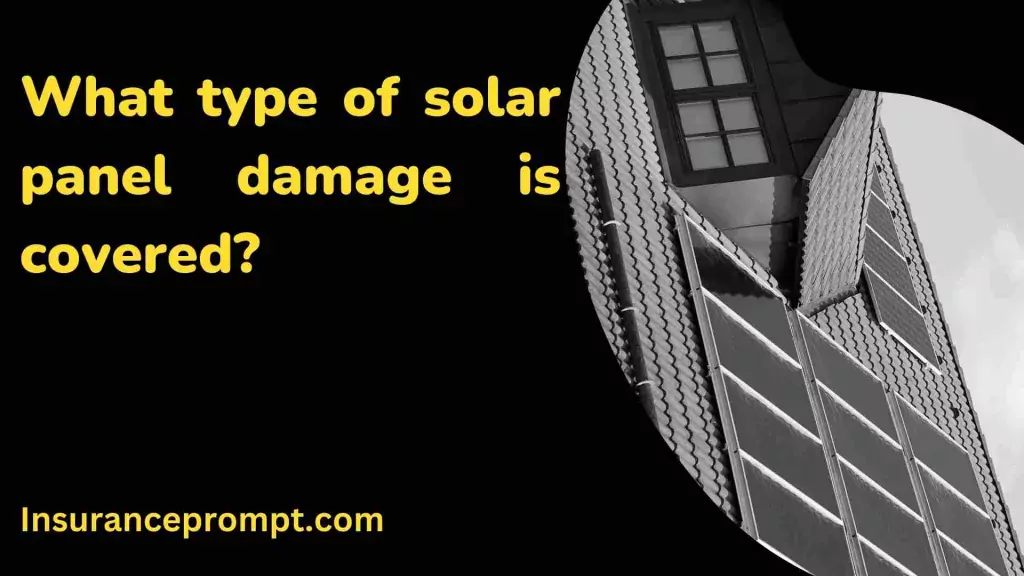
Covered perils include windstorms, fire, lightning, hail, or fallen trees. If a covered peril damages your solar panels, your homeowners’ policy may cover the repair or replacement.
It’s important to note that some policies may exclude damage to solar panel attachments when a particular threat, such as wind, causes it.
In this case, you may need additional coverage for specific threats. To ensure that your solar panels are fully protected, review your coverage limits and ensure they are high enough to cover damage to your home and solar panels.
You may even want to factor the complete replacement costs of your system into your overall coverage limit.
In summary, most homeowners insurance policies cover solar panels from all the same perils as your home’s dwelling. Covered perils include windstorms, fire, lightning, hail, and fallen trees.
However, some policies may exclude damage caused by threats like the wind. Reviewing your coverage limits and considering raising them if needed is essential.
Solar leases generally require no down payment and will cost you anywhere from $50 to $250 monthly. Some states offer solar leases and power-purchase agreements (PPAs) that allow you to rent a solar panel that a third-party company technically owns.
Roof Damage, Solar Panels, and Insurance Coverage
If you have roof-mounted solar panels, your homeowners’ insurance policy may pay to repair or replace them if they’re damaged by a covered peril such as wind or hail. However, some insurers may not cover wind or hail damage to roof-mounted solar panels.
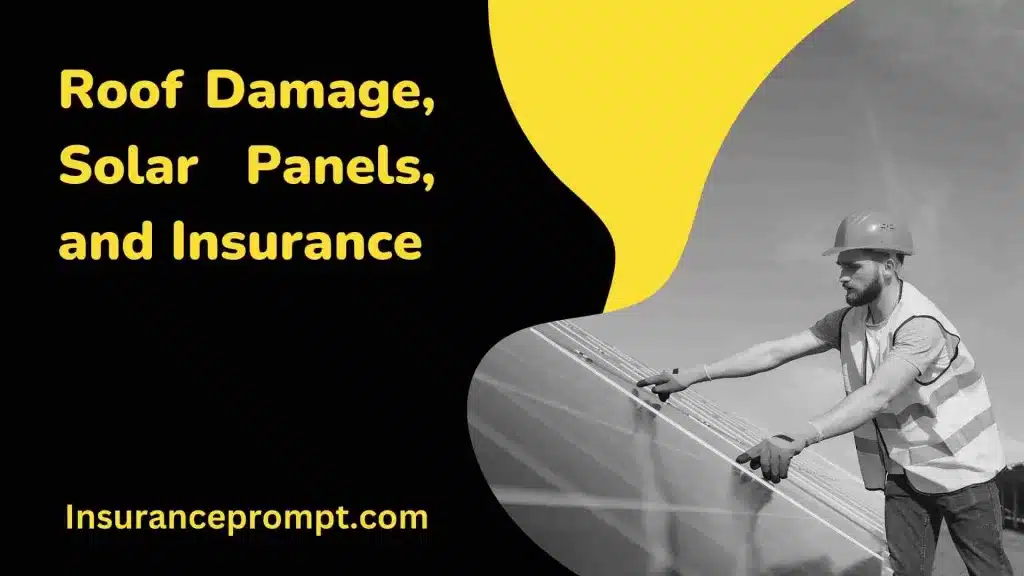
It is essential to inform your insurance company that you have installed solar panels on your home, whether you buy or ease them. If you lease your panels and insure them yourself, your insurance company may limit any claim payout for wind and hail damage since you don’t own the panels.
Most homeowners insurance policies include solar panel insurance coverage, which means no separate solar panel insurance is needed. Solar energy systems and rooftop panels or tiles are a permanent attachment to your property, similar to a patio or a security system.
However, some policies may exclude damage to these attachments when a particular threat, such as wind, causes it.
Checking your policy details and adjusting claim limits is essential if needed. Your home insurance covers permanent rooftop solar panels from all the same perils as your home’s dwelling.
If a windstorm damages your roof and panels or a fire destroys your entire home, you can replace your solar panels with minimal additional cost. Consider raising your dwelling or insurance rider coverage limits to protect your initial investment in your solar panels. This helps ensure that any damage to the house and the attached solar panel system will be covered.
Frequently Asked Questions
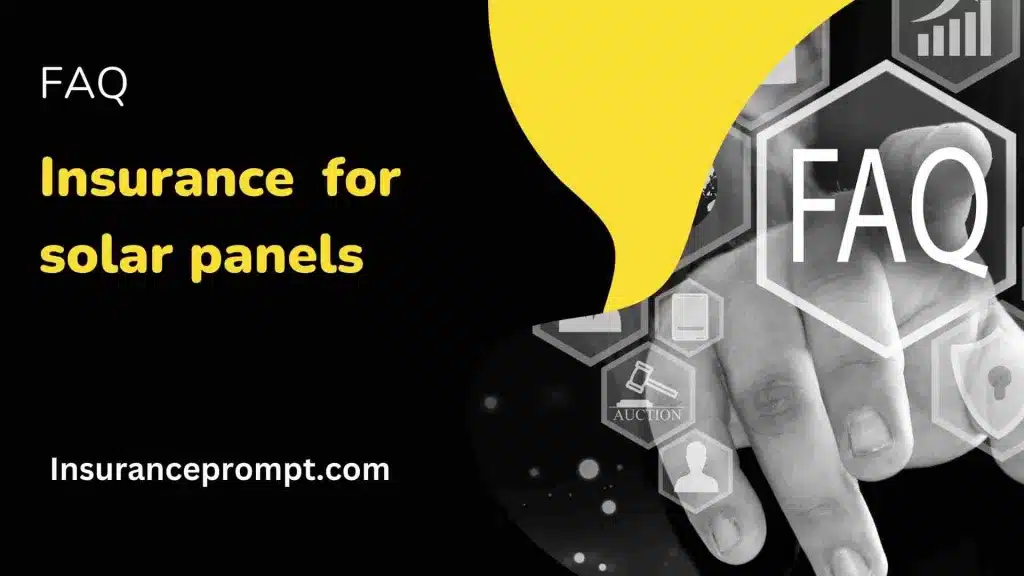
Should I raise my coverage limits if I get solar panels?
You may need to raise your coverage limits to account for the replacement cost of your solar panels, which will likely result in some increase to your homeowners’ insurance premium. However, standard homeowners’ policies cover most rooftop solar energy systems, which doesn’t change your insurance plan. You must check with your insurance provider to understand what is and isn’t covered in your policy and whether you need to adjust your coverage limits.
Does homeowners insurance cover hail damage to solar panels?
Some homeowners insurance providers may not cover hail damage to roof-mounted solar panels, while others may exclude hail damage based on the vulnerability of the panels.
However, standard homeowners’ policies cover most rooftop solar energy systems as permanent attachments to the home. You must check with your insurance provider to understand what your policy doesn’t cover.
When should I purchase separate solar panel insurance?
You may need to purchase separate solar panel insurance if your homeowners’ insurance policy doesn’t provide coverage or provides limited coverage for solar panels. However, most homeowners insurance policies include coverage for rooftop-mounted solar panels as permanent attachments to the home. You may need an insurance endorsement if you have a ground-mounted or carport solar panel.
Does homeowners insurance cover roof leaks with solar panels?
The dwelling coverage on your homeowners’ policy may pay to repair or replace roof-mounted solar panels if a covered peril damages them. Most homeowners insurance policies include coverage for rooftop-mounted solar panels as permanent attachments to the home, so no separate solar panel insurance is needed. However, homeowners insurance won’t cover leaks caused by wear and tear or poor maintenance, as it is the homeowner’s responsibility to maintain their roof.
What insurance companies cover solar panels in Florida?
Florida Peninsula Insurance Company (FPI) offers coverage for solar energy panels that meet certain requirements. Citizens Property Insurance Corp., the state-backed insurer of last resort and the largest carrier in Florida, will write some homes with solar. However, fewer insurance companies are covering solar panels on homes in Florida. It’s important to check with your insurance provider to understand what your policy doesn’t cover. Harris Insurance is a Florida-based homeowners insurance expert that has researched coverage for solar panels.
Does homeowners insurance cover solar panels?
Most homeowners insurance policies cover solar panels attached to your home, so no separate solar panel insurance is needed. Solar panels not attached to your home, such as ground-mounted panels, may be covered by your homeowners’ insurance policy under other structures. However, the level of coverage may depend on where the panels are located and whether you own or lease them. You must check with your insurance provider to understand what your policy doesn’t cover.
What is an umbrella policy for solar panels?
A Personal Liability Policy (PLP), also known as an umbrella policy, provides the policyholder with an additional layer of coverage that goes above and beyond the policyholder’s home and auto insurance liability coverage limits if a person is seriously injured at the policyholder’s fault.
In Florida, homeowners who install Tier 2 solar systems must have proof of Tier 2 insurance, which includes a PLP or umbrella policy. You must check with your insurance provider to understand what is and isn’t covered in your policy and whether you need additional coverage for your solar panels.
Conclusion
In conclusion, solar panels are low maintenance and have a long lifespan but are not invincible. Accidents, severe weather, theft, and unexpected damage can occur, leaving homeowners with costly repairs or replacements.
By investing in insurance, homeowners can have peace of mind knowing that if something does happen, they are protected financially. It is essential to carefully review policies to ensure coverage is offered for all potential scenarios.
Some policies may seem like a good deal but could exclude coverage for certain types of damage or have high deductibles, leaving homeowners to pay steep out-of-pocket costs. Researching and choosing the right policy can provide the necessary protection and save money in the long run. Overall, obtaining insurance for solar panels is a wise decision that helps protect your investment.
References
How Much will my Electricity Bill be with Solar Panels? https://solar-grants.co.uk/how-much-will-my-electricity-bill-be-with-solar-panels/
Do I Need A Permit To Install Solar Panels In California for 2020? https://usa-gce.com/do-i-need-permit-to-install-solar-panels-in-california/
What You Need to Know About Adding Solar Panels to Your Home. https://www.wawanesa.com/us/blog/what-you-need-to-know-about-adding-solar-panels-to-your-home
Spring Savings on Energy Smart Homes – Taylor Homes. https://www.taylorhomes.com/blog/spring-savings-on-energy-smart-homes
Does Homeowners Insurance Cover Solar Panels? – Nationwide. https://www.nationwide.com/lc/resources/home/articles/solar-panel-insurance
What Insurance Companies Cover Solar Panels – SolarProGuide.com. https://www.solarproguide.com/what-insurance-companies-cover-solar-panels/
Does Homeowners Insurance Cover Solar Panels? | Progressive. https://www.progressive.com/answers/does-home-insurance-cover-solar-panels/
Solar Panel Insurance | Hippo. https://www.hippo.com/learn-center/solar-panel-insurance
Understanding High-Value Homeowners Insurance: Benefits and Features …. https://www.teamais.net/blog/the-ultimate-guide-to-understanding-the-benefits-of-high-value-homeowners-insurance/
What Happens to Solar Panels in a Hurricane? – Solar Reviews. https://www.solarreviews.com/blog/what-happens-to-solar-panels-in-a-hurricane
Does Homeowners Insurance Cover Solar Panels? – Policygenius. https://www.policygenius.com/homeowners-insurance/solar-panel-insurance/
Everything You Need to Know About Solar Warranties. https://www.smartsolarenergyco.com/everything-you-need-to-know-about-solar-warranties/
What Is an Umbrella Policy for Solar Panels (Explained!). https://solarmesa.com/what-is-an-umbrella-policy-for-solar-panels-explained/
- Does M&S Do Car Insurance? A Full Guide In 2024 - April 15, 2024
- Pet Insurance for Older Dogs: 2024 Full Guide & Top Providers - March 17, 2024
- Small Business Equipment Breakdown Insurance: Full Coverage - November 6, 2023

